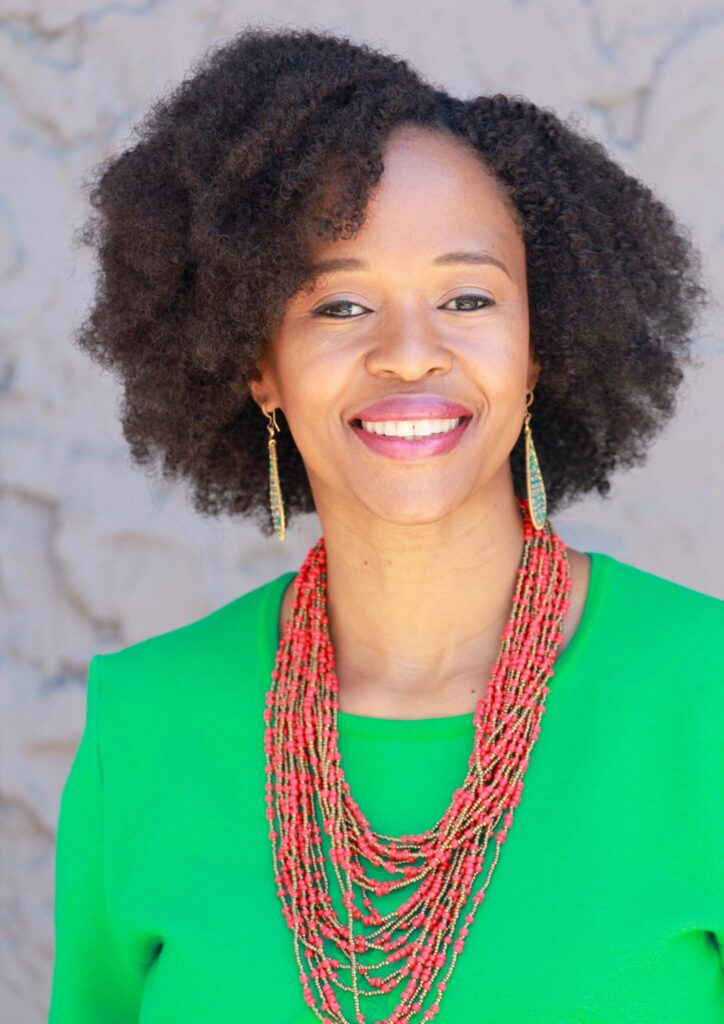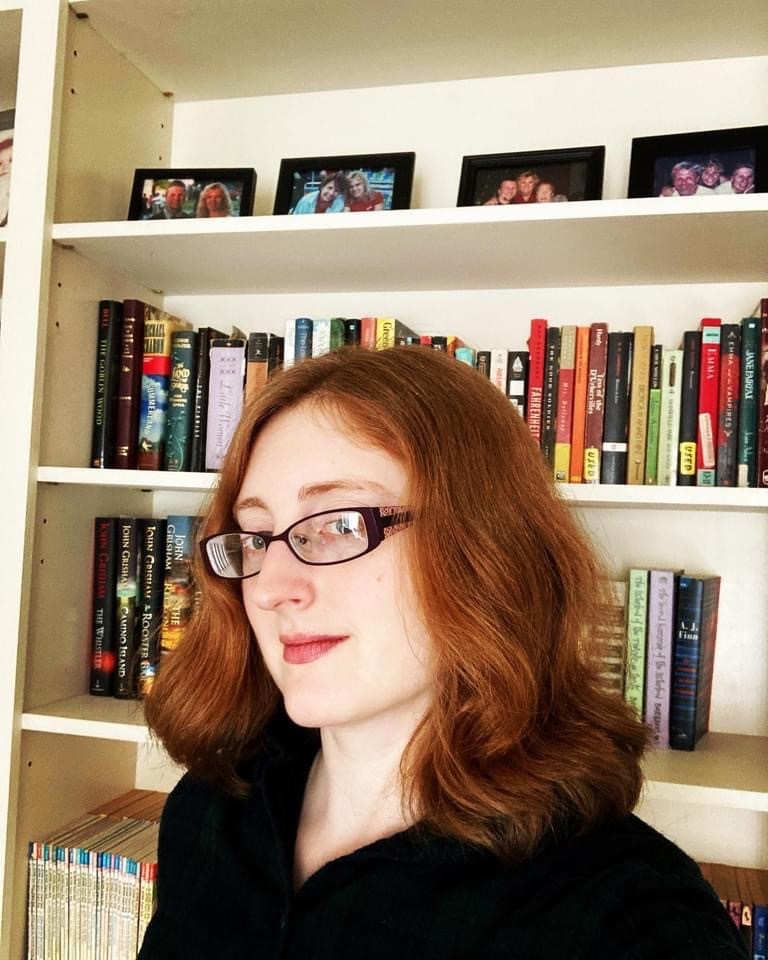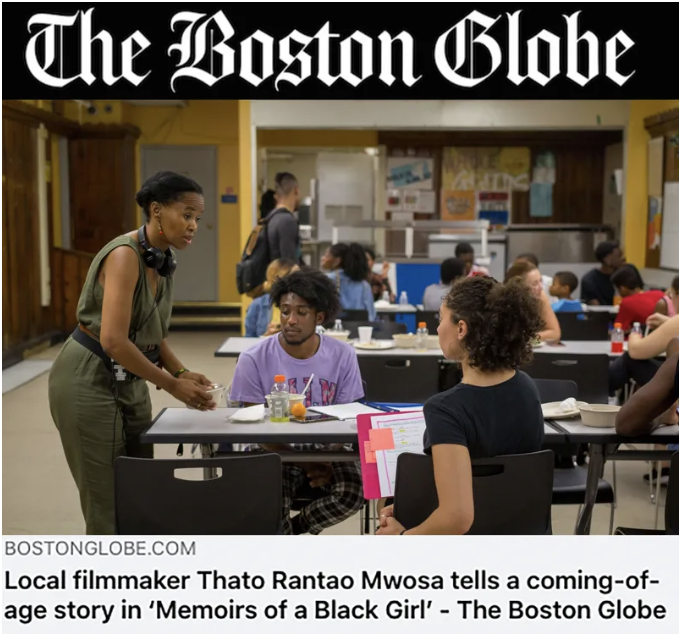For this interview, we had the pleasure of talking with Thato Mwosa about the enriching experience of working with teens in her films, teaching students at the Lesley MFA in Creative Writing program as an alum, and using her work to provide a counter-narrative on the African diaspora.
THATO MWOSA – WRITING FOR STAGE AND SCREEN, JUNE 2017

THATO R. MWOSA is an award-winning screenwriter, filmmaker, and illustrator. She has written and directed several short films and documentaries. In 2019, she wrote and directed her first feature film, Memoirs of a Black Girl, which premiered at the 2021 Boston Globe’s Black History Month Film Festival. The film was screened at prestigious festivals such as the Pan African Film Festival, The Bronze Lens Film Festival, Martha’s Vineyard African American Film Festival, and many more. Thato has written, produced, and directed several short film projects for organizations such as the Massachusetts Department of Public Health, U-Mass Amherst, Brigham and Women’s, Boston Medical Center, and Africans for Improved Access. She has been featured by several media outlets, including WBUR, Boston Globe, and Basic Black (WGBH). Thato is an Assistant Professor of Screenwriting at Emerson College in Boston.

Interviewed by
Julia Leef
Let’s talk about your latest short film series which includes the following films: Temple, Desmond in Motions, Don’t Look Away, and Something to Tell You. You did these films as a collaboration with the Department of Public Health’s Youth Initiative program—how did this partnership come about, and what was it like working with the teens?
I have been working as an educator, primarily focusing on youth, for quite some time now. Many of my films explore various issues that young people confront. The Department of Public Health (DPH) reached out to me due to my previous work with youth.
For this series, I partnered with various organizations in the greater Boston area. The initial film was created in early 2022, in collaboration with Girls Inc. of Lynn. [Something to Tell You] centers around a young non-binary individual who grapples with the necessity of revealing their identity to their conservative parents.
The second film, titled Don’t Look Away, about a first-generation African girl who wants her parents to accept her choices, was a joint effort with the youth of Teen Block in Lowell. The third film, Temple, explores issues related to teen body image and was created in partnership with the youth of Girls Inc. of the Valley. The final film, Desmond in Motions, was a collaboration with the youth of Making Opportunity Count.
Working alongside these young individuals was an enriching experience. They contributed their ideas, which I then used to craft the screenplays. During production, these youth actively participated as both actors and production assistants. They gained valuable insights into the filmmaking process, from the inception of the script to the final product on screen.
Highlights from Thato’s film, Something To Tell You
You also recently completed a teaching period at our alma mater, Lesley University, in the Creative Writing MFA program. What was your experience teaching at an institution of which you are also an alum?
Initially, it felt unusual to sit at a table with my former professors, but their warm welcome and the way they treated me as an equal quickly put me at ease. I enjoyed working with the students, especially considering that I had once been in their shoes, grappling with deadlines, seminars, craft papers, and all the challenges that come with it.
What guidance were you able to impart on your students that you learned from your own time at Lesley?
Absorb as much knowledge as you can because time flies by swiftly. Additionally, maintain connections with your fellow students and persist in refining your scripts and plays even beyond graduation. I’m still closely connected to the cohort I was a part of many years ago during my time at Lesley University.
Of course, we have to talk about Memoirs of a Black Girl, which you completed in late 2020 and won the 2021 Hamilton Black Film Festival awards for Best Feature Film and Best Actress. How was the process of taking that work from its inception to finding your cast to watching it make the rounds at film festivals?
Creating “Making Memoirs” was a true labor of love. Securing funding for the project was challenging, but thanks to the generosity of donors and some small grants, we were able to proceed with filming. The production of Memoirs was an invaluable learning experience, as we encountered numerous challenges along the way. At one point, we even had to temporarily pause production to reevaluate our strategy before resuming.
Then came the unexpected challenges of 2020, just as we launched our post-production fundraising campaign. Given the global pandemic, we made the difficult decision to suspend the campaign for several months, as it didn’t feel appropriate to fundraise during such a critical time. Ultimately, we completed the film in 2021.
To our surprise, the film enjoyed a remarkable festival run. It gained acceptance into numerous prestigious African-American/Black film festivals and received several awards, exceeding our expectations.
Thato and her film were featured in The Boston Globe in October 2021.
You’ve also directed several short films for the medical community, including Brigham and Women’s Hospital and Boston Medical Center. Did these institutions reach out to you?
I was hired by a Boston-based production company named Element to direct short documentaries for Boston Medical Center. In the case of Brigham’s, I collaborated with a local organization known as the Multi-Cultural AIDS Coalition.
Since this was contracted work–how did you balance fulfilling the clients’ requests versus your own vision as a director? Or do you feel that your role as a director is to bring out the vision of your clients as best you can?
Above all, when collaborating with clients, it’s crucial to grasp their vision and bring it to life. Clients prioritize content and messaging, and my role involves translating that content into a visually creative format that effectively conveys the intended message to the target audience. This process is a genuine collaboration, where understanding and executing the client’s vision are paramount.
And you don’t just work in film. You’ve done projects in other mediums, such as your book, 14 African Women Who Made History, your Tuli Art, and your SAWA African Trivia Card Game. What encouraged you to explore those avenues, and are there any other mediums you might look to in the future?
Through my work in various mediums such as film, literature, and now card games, I challenge and dismantle antiquated portrayals and misconceptions surrounding Black African identity. Ultimately, my creative endeavors, books or films, are dedicated to providing a counter-narrative on the African diaspora, with a particular emphasis on the experiences of women and girls. As for another medium, I also write plays and I would like to have my full-length play, Americanized, produced on stage one day.
Do you have any dream projects or casts that you’d love to work on one day?
I’m working on two features that I would love to produce in the next few years. I would like to shoot my film, A Blue Dawn, which is set in my home country of Botswana.
Clips from many of Thato’s films can be found on her website here.


Comments are closed